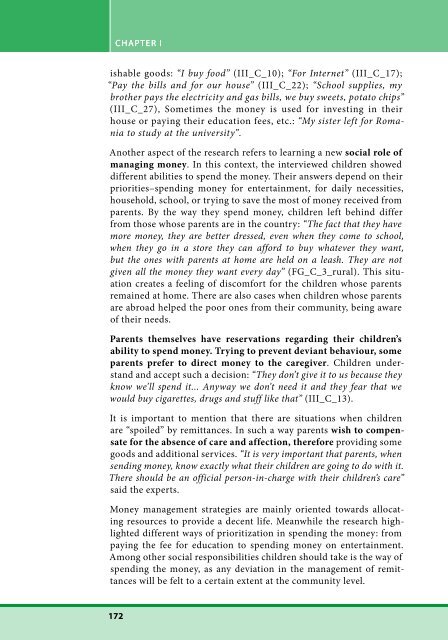specific needs of children and elderly left behind as a ... - IOM Moldova
specific needs of children and elderly left behind as a ... - IOM Moldova
specific needs of children and elderly left behind as a ... - IOM Moldova
Create successful ePaper yourself
Turn your PDF publications into a flip-book with our unique Google optimized e-Paper software.
CHAPTER I<br />
ishable goods: “I buy food” (III_C_10); “For Internet” (III_C_17);<br />
“Pay the bills <strong>and</strong> for our house” (III_C_22); “School supplies, my<br />
brother pays the electricity <strong>and</strong> g<strong>as</strong> bills, we buy sweets, potato chips”<br />
(III_C_27), Sometimes the money is used for investing in their<br />
house or paying their education fees, etc.: “My sister <strong>left</strong> for Romania<br />
to study at the university”.<br />
Another <strong>as</strong>pect <strong>of</strong> the research refers to learning a new social role <strong>of</strong><br />
managing money. In this context, the interviewed <strong>children</strong> showed<br />
different abilities to spend the money. Their answers depend on their<br />
priorities–spending money for entertainment, for daily necessities,<br />
household, school, or trying to save the most <strong>of</strong> money received from<br />
parents. By the way they spend money, <strong>children</strong> <strong>left</strong> <strong>behind</strong> differ<br />
from those whose parents are in the country: “The fact that they have<br />
more money, they are better dressed, even when they come to school,<br />
when they go in a store they can afford to buy whatever they want,<br />
but the ones with parents at home are held on a le<strong>as</strong>h. They are not<br />
given all the money they want every day” (FG_C_3_rural). This situation<br />
creates a feeling <strong>of</strong> discomfort for the <strong>children</strong> whose parents<br />
remained at home. There are also c<strong>as</strong>es when <strong>children</strong> whose parents<br />
are abroad helped the poor ones from their community, being aware<br />
<strong>of</strong> their <strong>needs</strong>.<br />
Parents themselves have reservations regarding their <strong>children</strong>’s<br />
ability to spend money. Trying to prevent deviant behaviour, some<br />
parents prefer to direct money to the caregiver. Children underst<strong>and</strong><br />
<strong>and</strong> accept such a decision: “They don’t give it to us because they<br />
know we’ll spend it... Anyway we don’t need it <strong>and</strong> they fear that we<br />
would buy cigarettes, drugs <strong>and</strong> stuff like that” (III_C_13).<br />
It is important to mention that there are situations when <strong>children</strong><br />
are “spoiled” by remittances. In such a way parents wish to compensate<br />
for the absence <strong>of</strong> care <strong>and</strong> affection, therefore providing some<br />
goods <strong>and</strong> additional services. “It is very important that parents, when<br />
sending money, know exactly what their <strong>children</strong> are going to do with it.<br />
There should be an <strong>of</strong>ficial person-in-charge with their <strong>children</strong>’s care”<br />
said the experts.<br />
Money management strategies are mainly oriented towards allocating<br />
resources to provide a decent life. Meanwhile the research highlighted<br />
different ways <strong>of</strong> prioritization in spending the money: from<br />
paying the fee for education to spending money on entertainment.<br />
Among other social responsibilities <strong>children</strong> should take is the way <strong>of</strong><br />
spending the money, <strong>as</strong> any deviation in the management <strong>of</strong> remittances<br />
will be felt to a certain extent at the community level.<br />
172

















